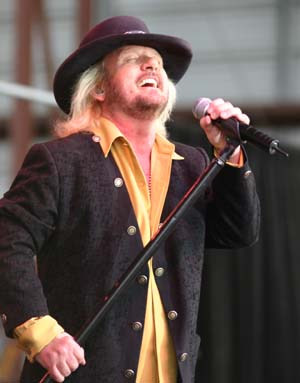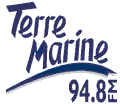
Copyright
© 2007 Road to Jacksonville
Webmaster : Patrice GROS
Tous droits reservés.
Design par Zion
pour Kitgrafik.com
38
Special
Michelle
LaRose speaks with Don Barnes for Road To Jacksonville / April 2008
Photographs by Michelle LaRose
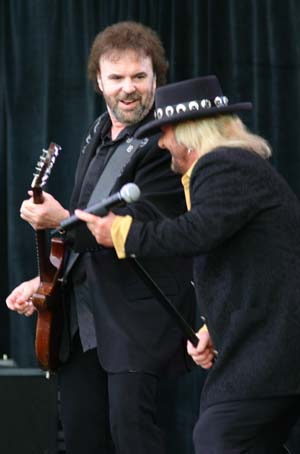
38 Special is rocking through their fourth decade together as one of southern rock’s most notable hit makers. They truly do not know how to Hold On Loosely because they have a tight reign on their career.
With an endless list of hits, Rockin’ Into The Night, Hold On Loosely, Fantasy Girl, Caught Up In You and If I’d Been The One just to name a few; these Wild Eyed Southern Boys are continuously in demand across the nation.
We were able to catch up with founder Don Barnes to chat about the band.
RTJ: Don Hi!
Don: How are you?
RTJ: Good!
Don: I’m
in Chicago. We’re going to be rehearsing for the PBS Soundstage. I don’t
know if I told you but we’re doing a conglomeration of a lot of artists
from different groups. Guys from Night Ranger, guys from Survivor, Martha
Davis from The Motels, Mickey Thomas from Starship.
We’re going to be taping on Wednesday.
RTJ: What is this?
Don: It’s
for PBS. It’s a program they have called Soundstage, it’s and hour
and a half, two hour show. They air a regular airing then they air it several
times through the year and also during
their pledge drive week where they receive donations.
RTJ: Do you know when this one is going to air?
Don: I
don’t know but I’ll let you know. They don’t have a schedule
yet.
They bring an audience in and we come out and do the hits.
RTJ: That’ll be fun being with all those other artists.
Don: Yeah.
Yeah. We’ve done a thing called World Stage every year. A portion of
the tickets
go to the Rainbow Foundation for children with illness. We do that every year
and that’s always been a fun thing, meeting all these guys. The guy from
Survivor, Jimmy Jamison the singer.
On all the video’s you see, he looks so serious… this guy’s
a goof-ball!
Both laughing
Don: He’s as funny as could be. I look forward to seeing them.
RTJ: You’re on the Volunteer Jam through August. Can you tell us what the Volunteer Jam is?
Don: That’s a traditional tour that Charlie Daniels has done since, oh God, since like ’75 or something. He always gets southern rock groups. It’s called the Volunteer Jam so during his set several people from the different groups come out and jam with him. ‘The South’s Going To Do It Again’ is the song where we all take a couple of big solos a piece. It’s a fun thing. He’s been successful with it all these years. We’ve done several of them with him. We did one about six years ago with The Outlaws.
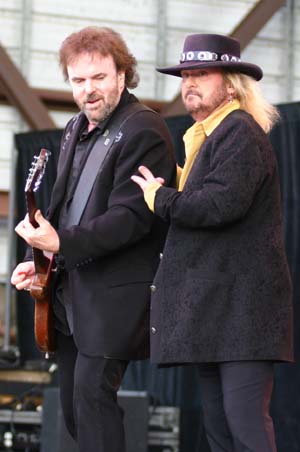
RTJ: You have a solo album, Ride The Storm. I read it was never released, why?
Don: Yeah it was during the end of the eighties. I had left the band for about four years and I had no personal life really just from trying to push so hard for success and keep things going and you find that you sacrifice a lot of things. During all those years of pushing I was just weary from it all. There was nobody behind the door waiting for me to come home you know. If you’re not happy in your heart then your work tends to reflect that.
During
that time I was given a deal with A&M Records. I traveled around and wrote
songs and put a lot of material together. Then in 1990, the year it was supposed
to be released the company, A&M, was sold to Universal in the area of
seven-hundred-million or something. But everybody that had release dates in
that year, it was kind of the kiss of death because what happens is they change
all the staff, everybody, completely, just gone. The guy who was championing
my project, was paying to write all the checks and all that… well he
was gone. He went to CBS. And so everyone just scatters when that sort of
thing… the restructuring, you know how that goes.
They restructure everybody. People don’t even know where their desk is.
So a lot of albums were shelved that year. Unfortunately mine was one of them. Then Universal having owned the masters, they’re just all about acquisition and the holdings. They’re not really interested in selling any master tapes to a second party. I was kind of stuck. Stuck there. After all these years I put it out. I told Tom Soares, our web site guy to make a web page and give it away for free. The thing about it is; You always want as many ears as you can on the music and that’s why with myspace pages and all that you gather a fan base. It just grows your fan base and they tend to seek out Greatest Hits packages plus they’ll come to live shows. You can’t download a live show. They’ll come to live shows, buy a t-shirt or a ticket to the show. But that’s the story on that. It’s still out there and probably won’t ever be released formally.
RTJ: Do you think you’ll ever do another solo album?
Don: We
are doing some different things now within our group. We are doing an acoustic
version of some of the big songs. You used to see the unplugged series on
MTV where groups are putting on an acoustic guitar and playing the songs,
playing the songs exactly like they are electric. That’s just boring
to us so we took those songs and we just changed them around. Slowed some
up.
We took the song “If I’d Been The One” and made it into a ballad
which came out very good. So were just doing some different applications or
treatments of those songs. Fantasy Girl, Hold On Loosely. They’re a little
more tame because of the unplugged aspect. We also just tried to rework it
as a different approach to it. It’s pretty interesting. So we’ll
have those out.
We’re also doing another live album and live video. After all these years you tend to see how you get lost in the shuffle with all the record companies. You know how the record companies are in trouble now with the radio fractioning. Fractioning the formats of radio. It’s hard to get your single out on a station where they’re going to play it numerous times in rotation. It used to be, back in the ‘80’s your new hit, your single, would be played five or six times a day. It would become the repeatability factor to people who liked the song and wanted to hear it again, they’d call in. That was the whole thing back then. Now if you have a single out and you can get it to rock radio or even classic rock radio; They play all the old songs from classic rock artists but they wont play any new music because of the way they’re structured. So you might get your single heard on Tuesday afternoon and then once again maybe on Saturday afternoon. It’s just not enough to get that blanket, that repeatability factor.
It’s a real tough thing. In light of all that we tend to hold on to what we have and we can sell it on the internet and sell it at shows. We always feel like the greatest commercial of all, the promotion is the people walking out from a show. They just got completely inundated and overwhelmed by the show.
RTJ: You produced .38’s last album Drivetrain, are you going to produce this album also?
Don: Yeah that’s another thing too. Through the years; The older you get the more wisdom you get about the fact that when you place something in someone else’s hands you relinquish all the power and at the same time you’re still controlling it and second guessing them. You kind of find out, “Nah, I could have done this myself.” A lot of producers turn out to be glorified engineers. They get great sounds, they can make a record sound good but there’s not any creative ideas musically. Between Danny Chauncey and myself, he’s an excellent idea man. We fill each others voids as far as ideas. He’s always instrumental; first of all he’s a great engineer too. He’s always been able to come up with something that I hadn’t thought of and vise-versa. He’d have something to throw at me and I’d add something to it that he hadn’t thought of. So it’s a good collaboration. Collaboration is the greatest thing. We always, over the years, spoke about ourselves as not particularly brilliant song writers but we’re great collaborators.
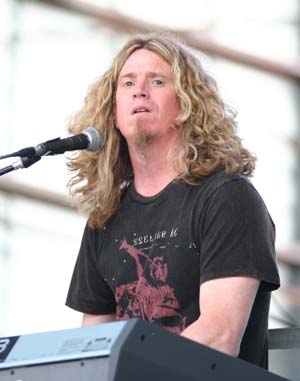
RTJ: I saw you catching a red fish on the internet. Are you an avid fisherman?
Both laughing
Don: Yeah
that was my little vacation last year down at the bayou. I’d been with
friends of mine that are there every year and they kept asking me every year,
“Man, you gotta’ come down and tear these red fish up.” So
I did it last year, planned it after the end of the tour. I got down to Louisiana
and got fifteen miles out from the coast in the bayou where there’s little
fish camp houses and things. Yeah, I’ve always had an interest in fishing.
That was a fun time. We tore em’ up. The first fish I caught was twenty-seven
pounds! I did a fishing show with Orlando Wilson a few years ago. It was funny
to have another boat with a camera, a camera boat filming him.
I don’t know if you’ve heard of Orlando Wilson, he has a fishing
show.
RTJ: Yes. Actually I have.
Don: That was a fun time. It was funny at the end because they didn’t have enough footage of fish being caught through the day and he was ready to go catch a plane or something and he told the camera guys, “Just pull over here in this cove and let me catch a fish.” It’s amazing to see a guy that knows how to do it. He just went over there and in three to five minutes he had a big fish! Man I wish I could do that!
Both laughing.
Don: But then again he wishes he could do what I do so…
Both laughing.
RTJ: What else do you like to do in your spare time outside of music?
Don: Well
I have a boat. I love to get out on the water. It’s a whole different
reality away from highways and traffic. In my line of work it’s a lot
of intensity. You saw it the other night.
You have a big PA. It’s loud; it’s feedback, its crowds cheering,
meet-n-greets. Then you get out on the water and you just drift. And you drift
some more. It’s just like being on a cloud.
You’re completely away from the reality of the road work. We do over
one hundred venues a year, we’re continually doing that. It’s a
respite away from all the badness.
RTJ: .38
Special’s Hold On Loosely is on Guitar Hero. How did it come to be that
you guys
are part of the hottest video game sweeping the nation?
Don: Isn’t that something? We were really surprised that they had picked it. It’s the Rocks The ‘80’s, Guitar Hero Rocks The ‘80’s. The greatest thing about it is it’s introduced all these little kids to our music. So we’ve seen a lot of kids write into the web site or their myspace page and they talk about that song. There’s another song called Stone Cold Believer that’s on Guitar Hero also.
Again, back to the radio being so fractured and the formats, they’re not exposed to the great music of the ‘80’s and well written songs. We always felt that the ‘90’s brought about a void because of all the grunge rock, we called them ‘shoe-gazers’. The guys were just full of angst and staring at the floor the whole time, playing these kind of monotone songs that really don’t have spirit or a bluesy power to them. The resurgence of the ‘80’s and classic rock is because of the void left in the ‘90’s. People are looking back beyond that and realizing there were a lot of great songs that were well written. Done by proficient guys that knew their craft and had done the training.
That was
another thing, these guitar players of the ‘90’s they might have
known five or six chords and they could pick songs from them but they really
didn’t study the “greats”. You know, the blues guys, Muddy
Waters, Clapton and Hendrix, Jimmy Page, all that back then that we grew up
on.
We were forced to learn our craft and be proficient at it because it was highly
competitive.
Now with Guitar Hero, in a way it’s worse because they’re picking
up a plastic guitar and flipping
a little trigger thing on it and not really learning anything.
But anyway, back to the Guitar Hero, someone sent me a Youtube video of kids, I mean little kids, probably eight and ten years old and they’re singing Hold On Loosely and one of the kids leans into the camera and says, “This song is the greatest song ever written!” It’s just a beautiful thing to me to see little kids that are getting exposed to it. They’re going to grow up and it prolongs our career. The whole resurgence thing especially the kids being exposed to all that. It’s a great thing. It keeps our career rolling. Like I said before, you can’t download a live show so they’ll come to the show to see it live. We see a lot of little kids out there. You see a lot of parents with their kids, they brought them up well. (Laughing)
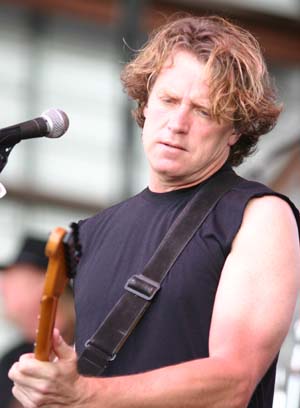
RTJ: That is one of the questions I was going to ask you; since the game is geared towards younger people, I wondered if you watched your audiences grow younger through the years. It sounds as if you have.
Don: Yeah. The parents grew up and their big brother had the record and they were exposed to it. The fans follow you, they stay with you because, again, the void left by other music that just didn’t have the same passion. So yeah, we see a lot of fans out there with young kids. The other night we were playing and there were like four… I could see them out there. There was like four twelve to thirteen year old guys, young kids. Through the curtains… the intro tape was playing and the lights are moving around and it’s all going on. They were high-fiving each other the whole time during the show when we hit the popular songs and I would just glance over at them out in the crowd over there and they were beside themselves. They were so excited about hearing their favorite songs. High-fiving and hugging each other. I was basically just playing to those four guys that night!
Both laughing
Don: Give them the thrill you know. Because that was us. We went to shows, we did the same thing when we were kids. We went and saw Led Zeppelin for six bucks.
RTJ: Whoo-ah! Those were the days!
Don: Donny was with me. We were all those same kids standing there high-fiving each other like, “Oh my God! I can’t believe how good this is!” It’s just a jolt for me, a good boost like I was playing to those guys. You tend to find people who are major fans out there. We’ve seen tears in people’s eyes. Because it takes them back through their life, they’ve attached their own emotional memories. They were going to college at the time or they dated somebody or they lost someone, so the songs speak to their heart. Those are the kind of people that we love to see because it keeps us on our toes. We want to put as much passion in those songs as in the first time we ever played them. We’ve played them a thousand times but if we’re just going through the motions every night it’d be boring to us so we try to find that common element, that emotional attachment out there and that sparks us to go “Hey, this song had truth to it when we wrote it and we’re going to put that same passion into it right now.” Because that truth still lives on.
RTJ: Timeless classics for sure.
Don: We
felt that Ronnie VanZant was a big mentor for the band. He told us a long
time ago,
he was older than us. He said, “Don’t try to be a clone of somebody
else. Don’t try to copy what’s already been done. Try to be yourself.
Put yourself in your own music. Put your own truth into it.
” Because the truth can’t be denied, no matter how it’s structured.
People still relate to that.
It’s a contrived story of “Oh baby I miss you, I want you.”
Whatever. It’s kind of contrived. Songs like Hold On Loosely came from
a divorce I was going through back in the early ‘80’s. It’s
out of something negative like that which came a positive message and that
truth still lives on. That’s why people still relate to it. All those
songs, Caught Up In You was about a girl I was dating at the time. I could
never get any work done, I was just so caught up in her all the time. It was
like a light bulb went off on the top of my head. I thought, “Wow! That’s
a great title for a song!” You work backwards. It’s like a roadmap.
You write to that title and you tell your story. The way art should be. The
beauty is in the simplicity of it.
RTJ: We were talking about Guitar Hero… Who’s your guitar hero?
Don: Plenty of them. But when I was a kid I always wanted to be Eric Clapton. I had his posters on my walls. His touch and his style of playing was fiery. Then I moved on to Leslie West from Mountain. He played a Les Paul Junior which I still play today. It’s just a good resonate slab of wood. He was a real stinger. He was just one of those guys that brings chills to you because he could just make it talk. Jeff Beck, speaking of making a guitar talk! Jeff Beck makes it sound like human voices coming out of it you know. I saw him about two years ago. We did a tour. He never sang a note. It’s all instrumental. It’s an hour and forty minutes and it was over so quick because you were mesmerized by this guy’s technique. I told somebody, I said, “That stuff’s not on my guitar!”
Both laughing (hard)
Don: (still laughing) I need to up-grade or something!
Both laughing.
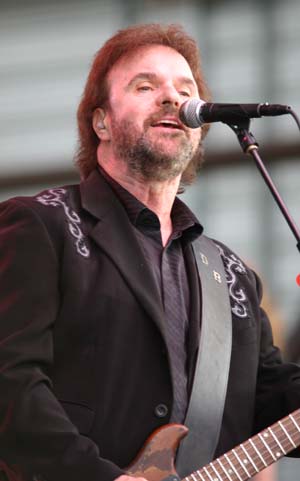
Don: But anyway, back to the guitar greats… Billy Gibbons of ZZ Top, the low-down Texas Blues the real thing. And of course all the Hendrix and Muddy Waters. I actually had a chance to sit and… Taz from the Charlie Daniels Band is a big blues fan, the keyboard player, Taz. I was sitting and talking to Muddy Waters one time, just me. It was years ago in Atlanta. We had done an album up in Connecticut. .38 Special had done an album in Dan Hartman’s house. Dan Hartman was the bass player for the Edgar Winter Group. Soon after we were done, Muddy Waters came in and did an album there with Johnny Winter producing. The housekeeper was a Jamaican woman, Elzra and she cooked all these big tables of food, just all kinds of Jamaican food. Muddy, he was on up in years at the time, he loved Elzra.
Both laughing
Don: He had a crush on her. When I talked to him, I saw him back stage. I said, “I just wanted to shake your hand and thank you for all the influence. By the way I did an album with Dan Hartman up there and I don’t know if you remember Elzra …” He just lit up! He went, “Have you talked to her? How’s she doing?” I sat there and talked to him for a while. He talked about how the old artists didn’t get their rewards from the royalties. He had all the stories about how they got ripped off and all that. So he went on about that. At the very end I said, “Well, I’m not going to keep you anymore Muddy. Do you mind if I could get your autograph. I don’t really ask for anybody’s autograph.” I had an old studio card in my pocket someone had given me and I just pulled it out and he signed it on the back “Muddy Waters”.
I kept that card. He passed away about five years later and I kept that card for years. I went and bought a big poster and mounted it and framed it and put in that little card he signed. It was just my little short memory of having a private audience with Muddy Waters.
RTJ: That’s an excellent story!
Don: Taz still can’t believe it. He’s like, “I can’t believe you got to sit and talk with Muddy Waters! I can’t believe it!”
RTJ: You started your career when they were pressing vinyl and now we download MP3’s. Do you think the advent of MP3’s has been good or bad for the band?
Don: Well, you know… technology marches forward. What are you going to say? The digital sound is a little brittle. We did like the warmth of the vinyl. I use iTunes myself and I made up a big library of all of my favorite songs. It’s probably hurt the industry, well I know it has. Back in, for instance 1987, the number one record on the charts was selling about 450,000 a week. Today, do you know what number one sells?
RTJ: No
Don: About 60,000.
RTJ: Really.
Don: It’s
the onslaught of the entertainment dollar being stretched. Video games and
Game Boys… Guitar Hero and all those kind of things. So people just aren’t
going to go out and spend $15.99 for a record where they’ve only heard
one song they liked on the radio, they’re not sure about all the other
songs. A lot of CD’s have a lot of “filler” material and so
people are big on just getting
a “single.” Getting the song they like and moving on.
Someone told me recently that they were in a record store which was an actual brick and mortar store, which are going out of business too. A little girl was with her Mom in there and they were searching through something and I think it was the new Maroon 5 that had come out. The mother turned to the daughter and said, “Look, here’s the new Maroon 5. Don’t you want to buy this?” The little girl said, “I already have one by them.” That’s their mindset.
They don’t
follow a band like they did back in the ‘80’s. If you were a fan
you bought every record. We put out fifteen albums or so and people have every
one of them. That just doesn’t happen anymore. It’s that mindset.
That whole indoctrination into the digital age it’s hurt a lot of people.
But at the same time, were back to my comment about, if you’re going
to download a song for free, chances are you’re going to be a fan. You’re
going to like the music. You get more ears on those same singles and chances
are they might look on Amazon.com and find that you can buy
the whole CD for $9.99 and here’s all the hits through the years. So
I think it turns into a positive, again, with the live shows. People come
to live shows you can’t download that so you have to come see it live
and that’s what we wanted as kids. We wanted to see it live. We wanted
to see em’ do it. In that sense it helps the older groups. These days
with people putting out their first album it’s tough. It’s tough
going. You could be changing tires next year.
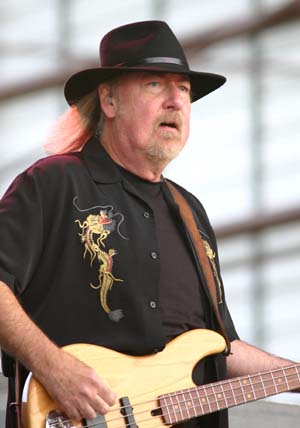
RTJ: So true.
Don: I’ve gone through some old Rolling Stone magazines up in the attic. I was moving some things. You see these guys on the cover of Rolling Stone and the very next year they’re gone! Never heard from again. So the fact that longevity was our goal in the first place, that’s what we’ve achieved. We didn’t want to be the flash in the pan. We were trying to back each song up with something better, something that would compete in the marketplace. Get more ears to the music, more listeners and get more radio play and chart positions. We were able to achieve that and we were lucky to have gone through a period of time where there used to be three and four acts on a show. A lot of people don’t do that anymore. That’s why Charlie’s Volunteer Jam was a good thing. He’s had four bands on there before. The longevity was our goal in the first place so that’s what we’ve achieved and we’re able to look forward to the future and do some innovative things and try to mold ourselves to the digital age and keep moving forward.
RTJ: You guys definitely have longevity. You’ve been together over thirty years.
Don: This band has been together longer than most of our marriages!
Both laughing.
Don: A
band is like a marriage. It’s give and take. There’s a definite
compromise, cooperation
and support in a group. It’s like a second family. We’ve found tolerance
with each other.
We’re all friends. You can tell we get along. We do a good business and
we do it well. We all have mutual respect and that’s the thing you have
to have. There’s been a couple of people that have come and gone through
the years that didn’t have that. We like to be friends. We all came from
the same poverty situation as kids. So when you suffer together, we’ve
gone through all the hard times. All the ‘dirt-floor’ clubs starting
out. When you suffer together you gain strength as a group, as a unit.
RTJ: This job is hard enough without discontent within the band.
Don: Yeah. We had to weed out the malcontents, you know.
Both laughing.
RTJ: Well Don, I’d like to thank you for speaking with Road To Jacksonville today.
Don: Sure Michelle. It was my pleasure.
